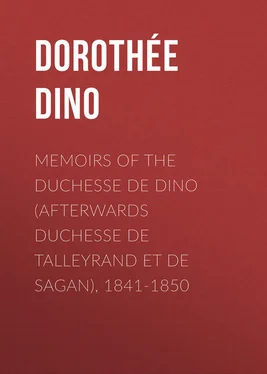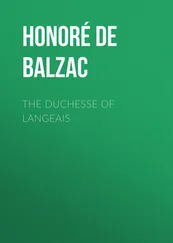Dino Dorothée - Memoirs of the Duchesse De Dino (Afterwards Duchesse de Talleyrand et de Sagan), 1841-1850
Здесь есть возможность читать онлайн «Dino Dorothée - Memoirs of the Duchesse De Dino (Afterwards Duchesse de Talleyrand et de Sagan), 1841-1850» — ознакомительный отрывок электронной книги совершенно бесплатно, а после прочтения отрывка купить полную версию. В некоторых случаях можно слушать аудио, скачать через торрент в формате fb2 и присутствует краткое содержание. Жанр: foreign_antique, foreign_prose, на английском языке. Описание произведения, (предисловие) а так же отзывы посетителей доступны на портале библиотеки ЛибКат.
- Название:Memoirs of the Duchesse De Dino (Afterwards Duchesse de Talleyrand et de Sagan), 1841-1850
- Автор:
- Жанр:
- Год:неизвестен
- ISBN:нет данных
- Рейтинг книги:4 / 5. Голосов: 1
-
Избранное:Добавить в избранное
- Отзывы:
-
Ваша оценка:
- 80
- 1
- 2
- 3
- 4
- 5
Memoirs of the Duchesse De Dino (Afterwards Duchesse de Talleyrand et de Sagan), 1841-1850: краткое содержание, описание и аннотация
Предлагаем к чтению аннотацию, описание, краткое содержание или предисловие (зависит от того, что написал сам автор книги «Memoirs of the Duchesse De Dino (Afterwards Duchesse de Talleyrand et de Sagan), 1841-1850»). Если вы не нашли необходимую информацию о книге — напишите в комментариях, мы постараемся отыскать её.
Memoirs of the Duchesse De Dino (Afterwards Duchesse de Talleyrand et de Sagan), 1841-1850 — читать онлайн ознакомительный отрывок
Ниже представлен текст книги, разбитый по страницам. Система сохранения места последней прочитанной страницы, позволяет с удобством читать онлайн бесплатно книгу «Memoirs of the Duchesse De Dino (Afterwards Duchesse de Talleyrand et de Sagan), 1841-1850», без необходимости каждый раз заново искать на чём Вы остановились. Поставьте закладку, и сможете в любой момент перейти на страницу, на которой закончили чтение.
Интервал:
Закладка:
There is nothing else in my letters which seems worth quotation, and even what I have extracted is chiefly trivial.
Rochecotte, February 23, 1841. – Some time ago I was advised to read a novel by M. Sainte-Beuve and not to be alarmed by the title of it, which was "Pleasure." I read half of it yesterday; though it wanders from the point in a manner more metaphysical than religious, and though the affectation and ruggedness of the style is obvious, I have been deeply touched by the book, which displays a profound knowledge of the human heart, a true sense of good and evil, and generally speaking, a loftiness of thought which is unusual in modern authors.
My son-in-law hears from Paris that the Chamber of Deputies was much disturbed by the report of M. Jouffroy concerning the secret service funds. The Chamber seems to have been living in a profound calm which has been disturbed by this report. It has revived all quarrels and severely criticises all past Ministries, while it speaks of the policy of the present Cabinet in terms which are unacceptable to many of its supporters. In short, it is an unfortunate incident, which is important in so far as it strengthens the arms of that important fraction of the Chamber known as the Dufaure-Passy party.
Rochecotte, February 24, 1841. – In the Friend of Religion , a little magazine which I take in to lend to my priest, I have found a long extract from the famous sermon of M. Lacordaire, which recently caused so much sensation at Paris, and which fortunately seems to have met with strong disapproval. As a matter of fact what I read is quite inconceivable, though there are many passages full of vigour and talent; but these are overwhelmed by strange assertions which reach the point of the scandalous and the dangerous. As his subject he took the duty of children to parents and from thence proceeded to an enthusiastic eulogy of the democracy: he said that Jesus Christ was above all things a member of the middle classes, and that France is supported by God because it breathes democracy. The late Mgr. de Quélen was quite right in his refusal to allow M. Lacordaire to preach unless he were himself present to keep an eye upon him. He mistrusted these strange doctrines which had long before been derived from his connection with M. de Lamennais, and though M. Lacordaire has remained a Catholic, he is largely affected by this evil teaching, which he received in his youth.
Prince Pierre d'Arenburg writes to say that on the day of the collection at Notre Dame Mgr. Affre summoned the ladies who were collecting to the sacristy, but he did not speak to them or give them a word of thanks, which they expected, as they were always accustomed to it from Mgr. de Quélen, who invariably thanked them with perfect grace; that Mgr. Affre then sent them into the church with a most abrupt "Now then, start," which was received with murmurs on the part of the ladies, according to my letter.
M. de Valençay writes to say that he has heard from a reliable source that overtures from the English Cabinet are still awaited and that it is believed that they will be forthcoming. He had met Madame de Lieven who had commissioned him to send me news of the fact and to add that M. Guizot is on the best of terms with the German courts. It appears that this week will decide the fate of the English Cabinet, which will be vigorously attacked.
The law upon the fortifications will not be put to the vote in the Chamber of Peers for a fortnight. It will be fiercely attacked by M. Molé, by the Chancellor and by the Legitimists. The court is very angry with the two first named. What the fate of the law will be is absolutely unknown as yet.
Madame de Nesselrode has left Paris full of enthusiasm for Parisian life, for Parisian things and people. I admit her goodness of heart and her generosity, but I think very little of her judgment.
Rochecotte, February 26, 1841. – I hear from Paris that a very select ball was given by Madame Le Hon and that she and Madame de Flahaut are now trying to refine their salon and to attract the Faubourg Saint-Germain; that in this respect a kind of reaction is expected; that every one is anxious to be counted a member of high society; that those who were formerly sought are now disdained and those are flattered who were formerly rejected.
I hear from Vienna that the daughter of the Prussian Minister Maltzan, a pretty young girl of twenty-four, is to marry Lord Beauvale, the English Ambassador; in age he could easily be her father; he has been a great rake and is eaten up with gout. However, she has preferred him to several possibilities, because he is an English peer, ambassador and brother of the Prime Minister. She has decided to make a brilliant marriage.
Rochecotte, February 27, 1841. – Yesterday my daughter had a long letter from young Lady Holland of whom she had seen a good deal at Florence. This little lady is now at London. I have asked my daughter's permission to select the interesting passages from this letter: "I doubt if any one, whatever trouble he took, could discover a more painful situation than ours, because I think that no one could find such a woman as Lady Holland, my mother-in-law. She surpasses everything that could be imagined in the way of rapacity and selfishness, and in a novel her character would be thought exaggerated and impossible. As you know, she became possessor of everything from my father-in-law, but that is not enough for her. She wishes to pull down Holland House where she spent forty years of her life and to build and to sell; in fact, Heaven knows what she does not wish, for the other day she was anxious to make an arrangement with her son which would deprive us of our small income which was arranged at our marriage, so that if the Ministry were to change to-morrow it is quite possible we should be reduced to live upon the interest from my dowry. Fortunately she cannot destroy Holland House without my husband's consent and he says he would rather cut his hand off than consent to sacrifice the smallest part of it, even of the park. Similarly she cannot sell the other estate of Ampthill without his consent. He would willingly give his consent to pay off the large mortgages with which she has burdened the property, which was immense and free from debt at the time of her marriage with Lord Holland, if she on her side would do something. She has so much of which she can unfortunately dispose that my husband has been advised to ask something in return for his consent. He only asked her to leave the house as it was during his father's lifetime, whom he worshipped, and whose memory is most dear to him. He told her that the library and papers which his father left behind were a hundred times more precious to him than the real property and the silver of which she can dispose. Well, she declines to do anything. She has consulted all her friends, who have pointed out the truth and asked her to do the right thing. The result is scenes and quarrels, while we must look on at everything and not offer a complaint. It is a difficult position and sometimes I feel my blood boil, but I restrain myself for my husband's sake and follow the example of his sons and his daughter whose patience towards her is angelical and who show a delicacy, a tenderness and reserve which she certainly does not deserve at times. In short, we must hope that a day will come when we shall be able to live in peace and return to that dear house which we have not been permitted to approach since our arrival. At present we must start as soon as we can and return to Florence by way of Paris.
"Fanny Cowper is not to marry Charles Gore. She cannot yet decide what she will do, and remains very pretty. 6 6 The daughter of Lady Palmerston by her first marriage and a niece of Lord Melbourne. Lady Fanny was to marry Lord Jocelyn a few months later.
The chief beauty of the moment is Lady Douro. The Duke of Wellington has recovered but commits such imprudent acts that it is impossible to rely upon him. Lord Cardigan has been hissed in the theatre, which is very unpleasant for those who go there. I went to his trial which interested me greatly. 7 7 Young Colonel Cardigan had several quarrels with officers in his regiment, and after a duel with Captain Harvey Tuckett, whom he wounded, he was summoned before the House of Lords in its judicial capacity in 1841; he was acquitted, and his trial was merely a necessary concession to the law of the land against duelling.
He is a handsome man, pale and interesting, and we peeresses were all so pleased that he was acquitted; but it was a somewhat theatrical business and I am afraid that in these days of reform and discontent it may cause some outcry against the House of Lords. My husband clearly pronounced the words 'Not guilty, upon my honour,' but they were delivered best of all by my cousin, Lord Essex. Towards evening the robes of the peers, the red tapestry and the presence of the ladies made a striking effect. The ladies chiefly admired were Lady Douro, Lady Seymour, Lady Mahon and my cousin, Caroline Essex.
Интервал:
Закладка:
Похожие книги на «Memoirs of the Duchesse De Dino (Afterwards Duchesse de Talleyrand et de Sagan), 1841-1850»
Представляем Вашему вниманию похожие книги на «Memoirs of the Duchesse De Dino (Afterwards Duchesse de Talleyrand et de Sagan), 1841-1850» списком для выбора. Мы отобрали схожую по названию и смыслу литературу в надежде предоставить читателям больше вариантов отыскать новые, интересные, ещё непрочитанные произведения.
Обсуждение, отзывы о книге «Memoirs of the Duchesse De Dino (Afterwards Duchesse de Talleyrand et de Sagan), 1841-1850» и просто собственные мнения читателей. Оставьте ваши комментарии, напишите, что Вы думаете о произведении, его смысле или главных героях. Укажите что конкретно понравилось, а что нет, и почему Вы так считаете.












